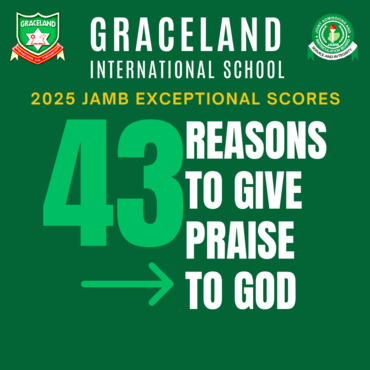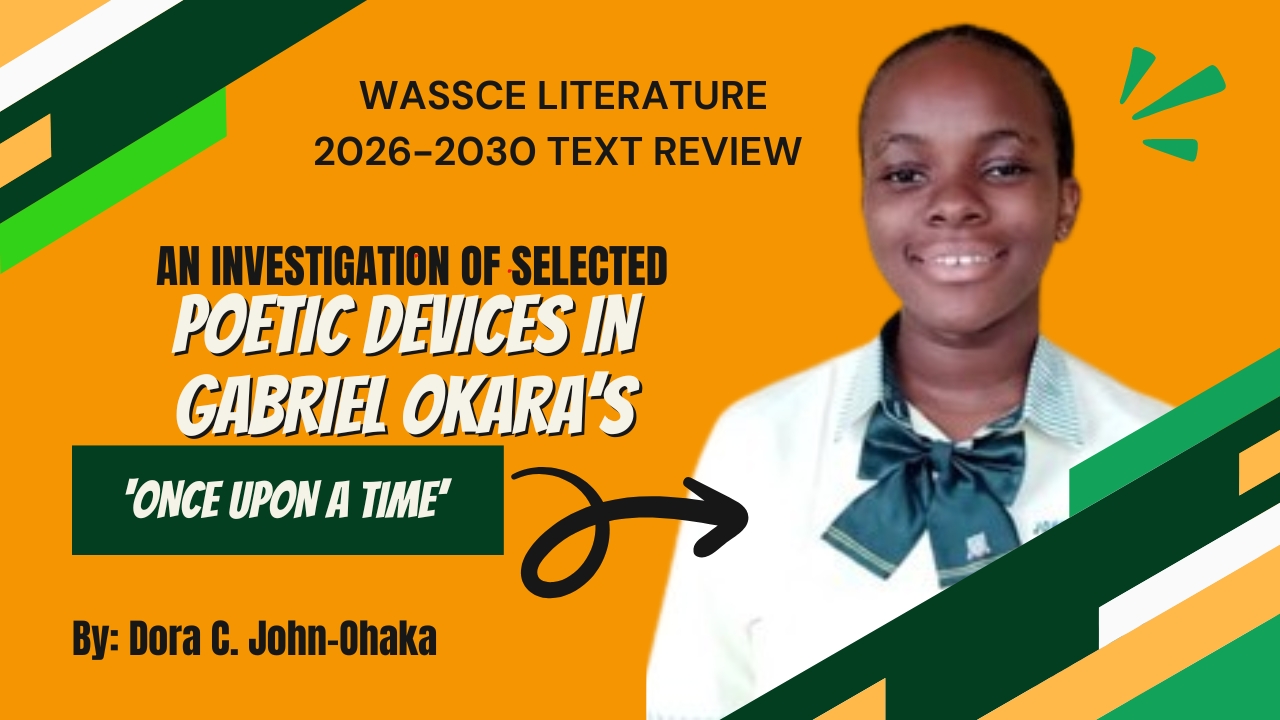
43 REASONS TO GIVE GOD PRAISE
June 3, 2025
66 Ken Saro-Wiwa Road, Port Harcourt, Rivers State, Nigeria. | Interlocking Road, Iriebe, Obio-Akpor, Rivers State, Nigeria

|
I |
n Gabriel Okara’s ‘Once upon a Time’, the themes of cultural clash, cultural
change, ageing and innocence, authenticity and deception are evident. The lines
‘they used to laugh with their hearts; and laugh with their eyes; but now they
only laugh with their teeth’ show that before Africans were colonized, they
used to show genuine love through their laughter but now they laugh with
insincerity and deceit. The lines show the change in Africans’ behaviour due to
the negative influence of the Westerners. These ideas are sustained by various
poetic devices such as enjambment, structure, repetition, symbolism, metaphor,
antithesis, etc. which are employed by the poet, some of which are explored in
this article.
First, repetition is used at
various points in the poem. Repetition refers to the use of an expression or
phrase many times in a poem to create emphasis. It is used emphatically to
address and buttress the subject matter of the poem. The expressions ‘laugh
with their hearts’, ‘teeth’, and ‘son’ are repeated and, thus, emphasized. The
expression ‘laugh with their hearts’ emphasizes the genuine love of Africans. ‘Laugh
with their teeth’, however, depicts insincerity in their laughter. ‘Shake hands
with their hearts’, which is also repeated, emphasizes the genuine friendliness
of Africans. The repeated word ‘son’, a symbol and voice which remains silent
throughout the poem, conveys through its silence the issue of overwhelming helplessness
and despondency in the face of current African reality. These expressions
emphasize the effects Africa’s cultural change brings.
Second, symbolism is
cautiously employed to sustain certain meaning. Symbolism refers to the meaning
representation of a word or expression. In other words, it simply refers to
what a symbol refers to. A symbol itself is a significant object that
culturally represents a meaning. It could be religious, social, traditional,
political or even individual culture. Symbols are significantly used for
meaning extension and for more vivid description. In the poem, several symbols
are used like ‘face’ which symbolizes different behaviours. The word ‘teeth’
represents the insincerity of Africans. ‘Snake’s bare fangs’ represents the
cunningness, deceit and wickedness of Africans after they were colonized. The
father’s voice, serving as the authorial voice in the poem, symbolises the old
Africa while the ‘son’, who is the unheard voice, represents the new Africa
battered by the western tradition. In another vein, the ‘son’ also symbolizes
innocence and purity which is why the father, after going down the memory lane,
towards the end of the poem, wishes that he be like the son, meaning he wants
to be pure, sincere and innocent again as he used to.
Next, the poet exploits enjambment
in the poem to sustain the story. Enjambment, also known as run-on lines,
refers to a situation where lines run into each other to complete their
meaning. It is the use of one line to complete another to make it reasonable. Enjambment
is the most used poetic device in the poem as it is seen throughout the poem.
It ties up the poem into an organic whole making the poem subtly prosaic; it
makes the entire poem appear in a story-like form which helps to tell the story
of the past. For instance, in lines 5 and 6 which say, ‘While their ice-block
cold eyes/search behind my shadow”, line 6 helps to complete the meaning of
line 5 which tells us what the ice-block cold eyes do. It tells us that Africans
watch others’ every move so that anything they do wrong can be used against them
to bring about their downfall. In lines 42 and 43, ‘I used to laugh and smile/Once
upon a time when I was like you’, line 43 helps to complete the meaning of line
42 which emphasizes when Africans used to laugh and smile before they were
colonized.
Furthermore, the poet deploys metaphors
to make his lines more vivid. Metaphor is the transfer of meaning from one
domain to another domain in describing an entity. It is consciously employed
not just to hide meaning but to make meaning more descriptive in the poem. The
expression “laugh with their hearts” as used in the poem is metaphorical. Literally,
people do not laugh with their hearts but with their mouths. This transfer of
meaning of the domain of laughter from mouths to hearts suggests that since heart
is a symbol of love, the laughter therefore is an expression of genuine love by
the Africans. Similarly, “Laugh with their teeth” transfers meaning from mouths
to teeth. Merely shining teeth for the sake of laughter culturally if
universally symbolizes fakeness. Hence, the expression is a mere expression of
formality which gives way to deception through insincere friendships. “Their
ice-block cold eyes; search behind my shadow”, another metaphor with
collocational clashes thus involving meaning transfers, depicts scrutiny of
people to find fault in them to bring about their downfall. These expressions
hide their meanings and can only be understood through analysis. They talk
about the subject matter of the poem but are hidden to encourage deep thinking.
In conclusion, the use of these
poetic devices helps to unite the structure of the poem. They help to buttress
the subject matter of cultural clash. They help to depict the meaning of the
poem along with its purpose. They are also used to make the poem a success.
Enjambment is used to sustain the poem in a story-like form. Metaphor is used
to interpolate words from different domains/fields, making the meaning of the
poem more vivid. Repetition is used to show emphasis on the subject matter of
the poem. And Symbolism is used to make meanings determinate and the poet seems
to employ more of private or personal symbols than conventional symbols. These
devices are all used calculatedly to display the cultural clash of the
Westerners and the Africans in the poem.
I must
thank The Graceland International School in its high academic standard
the tutelage of which I have passed. I also thank Mr. Prince Wekpa, my
literature teacher, whose literary prowess has groomed me to this excellence.
Copyright © 2026 Graceland International School